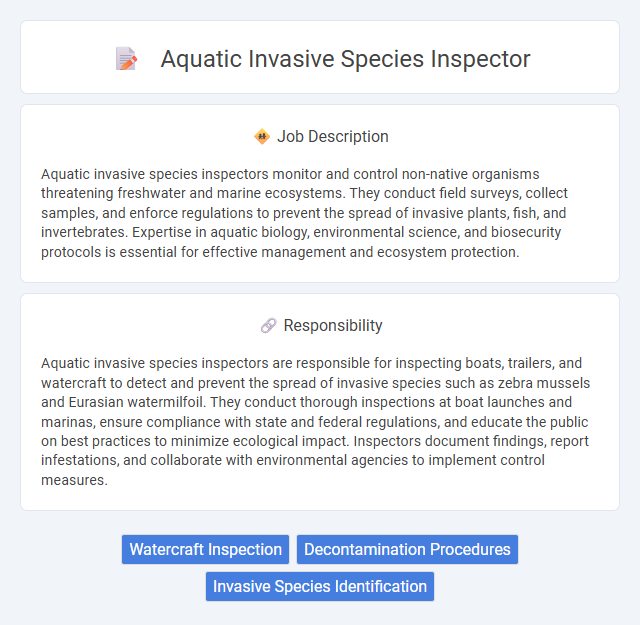
Aquatic invasive species inspectors monitor and control non-native organisms threatening freshwater and marine ecosystems. They conduct field surveys, collect samples, and enforce regulations to prevent the spread of invasive plants, fish, and invertebrates. Expertise in aquatic biology, environmental science, and biosecurity protocols is essential for effective management and ecosystem protection.
Individuals with strong attention to detail and physical stamina are likely well-suited for the role of an aquatic invasive species inspector, given the demanding outdoor conditions and need for meticulous examination of watercraft and equipment. Those who are comfortable working in various weather conditions and possess a keen interest in environmental conservation probably find satisfaction and effectiveness in this position. Conversely, candidates who struggle with extended outdoor activity or lack interest in ecological protection may face challenges adapting to the job requirements.
Qualification
Successful Aquatic Invasive Species Inspectors typically possess a background in environmental science, biology, or a related field, with experience in aquatic ecosystems. Key qualifications include knowledge of invasive species identification, data collection techniques, and familiarity with regional environmental regulations. Strong observation skills, physical stamina for fieldwork, and proficiency in using inspection tools and reporting software are essential for effective monitoring and prevention efforts.
Responsibility
Aquatic invasive species inspectors are responsible for inspecting boats, trailers, and watercraft to detect and prevent the spread of invasive species such as zebra mussels and Eurasian watermilfoil. They conduct thorough inspections at boat launches and marinas, ensure compliance with state and federal regulations, and educate the public on best practices to minimize ecological impact. Inspectors document findings, report infestations, and collaborate with environmental agencies to implement control measures.
Benefit
Aquatic invasive species inspectors likely provide significant benefits by preventing the spread of harmful non-native organisms that disrupt ecosystems. Their work probably enhances biodiversity conservation and protects water quality, which can safeguard local fisheries and recreational activities. Employing these inspectors may reduce long-term economic costs associated with managing invasive species outbreaks.
Challenge
The aquatic invasive species inspector role likely presents challenges such as identifying and managing diverse invasive organisms in varied water environments. Inspectors probably face difficulties in early detection due to species' small size or resemblance to native species, requiring keen observation skills and technical knowledge. They may also encounter logistical challenges in remote or difficult-to-access aquatic habitats while ensuring compliance with environmental regulations.
Career Advancement
Aquatic invasive species inspectors play a critical role in monitoring and controlling non-native organisms in water bodies, essential for preserving biodiversity and protecting ecosystems. Career advancement opportunities include senior inspection roles, project management, and positions within environmental policy development, enhancing one's impact on conservation efforts. Gaining certifications in environmental science and specializing in aquatic ecosystems can propel inspectors toward leadership or research roles in environmental agencies and organizations.
Key Terms
Watercraft Inspection
Aquatic invasive species inspectors specialize in watercraft inspection to prevent the spread of harmful organisms such as zebra mussels and Eurasian watermilfoil. They conduct thorough examinations of boats, trailers, and equipment for invasive species before water entry or exit, ensuring compliance with environmental regulations. Accurate identification and effective decontamination protocols are essential to protect native ecosystems and maintain water quality.
Decontamination Procedures
Aquatic invasive species inspectors follow strict decontamination procedures to prevent the spread of non-native organisms between water bodies. They meticulously clean and disinfect equipment, boats, and gear using EPA-approved solutions and hot water treatments to eliminate invasive species such as zebra mussels and Eurasian watermilfoil. Proper decontamination protocols are essential for protecting native ecosystems and complying with environmental regulations.
Invasive Species Identification
An Aquatic Invasive Species Inspector specializes in identifying non-native organisms that disrupt local ecosystems, using advanced techniques such as molecular analysis and field surveys. Their expertise includes recognizing invasive plants, fish, and invertebrates that threaten water quality, biodiversity, and commercial fisheries. Accurate identification is critical for early detection and rapid response to prevent the spread of harmful aquatic species.
 kuljobs.com
kuljobs.com